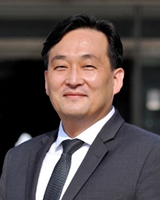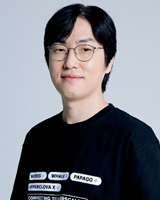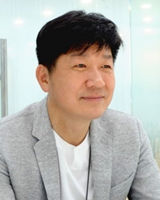
ModeratorByoung Joon Kim
- Organization, Position : Professor, Kookmin University, Department of Public Administration
- Curriculum Vitae
- 2022~Present: Director of Global Development Cooperation Institute, Kookmin University,
- 2022~2023: Vice President for General Affairs, Kookmin University
- 2020~2022: Vice President for External Affairs, Vice President for International Affairs, & Dean of Graudate School of Public Administration, Kookmin University
- Dr. Byoung Joon Kim is the Professor of Public Administration and the the Director of Global Development Cooperation Institute at Kookmin University currently and was the Vice President for General Affairs, the Vice President for International Affairs & Dean of the Graduate School of Public Administration at Kookmin University, Seoul, South Korea. Before joining Kookmin University, he was a faculty member in the Department of Public Policy at Indiana University-Purdue University Fort Wayne, USA. He earned a Ph.D. in public administration and public affairs from Virginia Polytechnic Institute and State University.

The Role of Universities in Fostering Inclusive Smart CitiesJennifer Cowley
- Organization, Position : President, The University of Texas at Arlington
- Curriculum Vitae
- 2022~present: President, The University of Texas at Arlington
- 2017~2022: Provost and Vice President for Academic Affairs, University of North Texas
- 2014~2017: Vice Provost for Capital Planning and Regional Campuses, Office of Academic Affairs, The Ohio State University
- Dr. Jennifer Cowley is the first female president of the university of Texas at Arlington and the 10th president in the University’s history. She is also a professor of public affairs and planning in the college of architecture, planning, and public affairs.
Previously, she was the provost and vice president for academic affairs at the university of north Texas, and prior to that, she held various leadership roles at the Ohio state university for 16 years, including serving as the vice provost for capital planning and regional campuses before she returned to Texas. Before entering academia, Cowley worked in city government in Amarillo and College Station. She is a fellow of American institute of certified planners.
The presentation highlights universities' integral role in shaping inclusive smart cities, exemplified by the University of Texas at Arlington (UTA). It showcases UTA's innovative research across diverse domains, including infrastructure, sustainability, public health and more.
Through partnerships and initiatives, UTA contributes to urban mobility enhancement, sustainable energy solutions, and the revitalization of public spaces. The university's broad approach aligns with the vision of smart cities, utilizing technology and collaboration to transcend barriers and create interconnected, prosperous urban environments that prioritize the welfare of all citizens.

Response strategy in Hyperscale AI Era Jung-Woo Ha
- Organization, Position : Head, NAVER Cloud AI Innovation
- Curriculum Vitae
- 2023~Present: Head of NAVER Cloud AI Innovation
- 2022~Present: AI-Data division chair, The Presidential Committee of Digital Platform Government
- 2022~Present: Member, National Association of Engineering of Korea
- Dr. Jung Woo Ha received his PhD in artificial intelligence from Seoul National University, served as the director of Naver AI Lab, and is currently the head of Naver Cloud AI Innovation. He is in charge of leading AI long-term advanced research including hyperscale AI and is responsible for global AI ecosystem strategy. For successful AI innovation in the public sector, he currently holds positions as the AI-Data division chair and the hyperscale AI TF team leader of the Presidential committee of Digital Platform Government. He is also active in various organizations such as the NAEK, AI Future Forum, and is working to expand the AI ecosystem through various activities
The unveiling of ChatGPT, Bard, Midjourney, Stable Diffusion and more has created insane hype around hyperscale generative AI. Hyperscale generative AI technology, which represents a paradigm shift that brings a profound change in our lifestyles and professional workways, is expected to open new growth opportunities in not only B2C services but also the corporate, social, and public sectors.
This presentation will introduce the concept of hyperscale generative AI, recent global technologies and industry trends, and look at NAVER’s hyperscale AI HyperCLOVA X and its ecosystem strategy. The presentation will also discuss the changes that hyperscale generative AI is expected to bring across industries, especially the public sector, and how to prepare for the next shift.

Ideal and reality for inclusive smart citySangyong Lee
- Organization, Position : Chief of Digital Affairs, Seoul Metropolitan Government
- Curriculum Vitae
- 2022~Present: Seoul Metropolitan Government, Chief of Digital Affairs
- 2017~2019: EY, RISK Lead Partner
- 2010~2017: KT, CISO
- Sangyong Lee, the Chief of Digital Affairs, is leading the innovation of Smart City, Seoul by being in charge of digital policies pursued by Seoul Metropolitan Government. He is an information security and IT expert who has comprehensively been in charge of technological security in large corporations such as KT, Samsung Electronics and Microsoft, and he also has an abundance of information and insights on multiple aspects of the business as a working-level executive who heads the consulting business at the global firm, EY. He has presented creative and innovative proposals by participating as the keynote speaker in numerous domestic and international IT conferences and forums. Recently, he has been striving to promote inclusive policies to accompany the digitally marginalized and integrate AI with administrative tasks in the public sector.
Future city would be a cutting-edge city that improves the quality of life and the competitiveness of the city while freely using advanced IT technology. Many countries across the globe are investing more on smart cities, and research and application plan for smart city is also being reviewed continuously. However, the key part of the smart city is to create an environment where all citizens can enjoy the benefits of the city without inequality while satisfying various demands of cities.
We should be able to easily access the technology of smart cities to realize the above, and the cost of technology should be kept at an affordable level and technology should be simple to use. At the same time, personal information of individuals should be respected and not infringed upon, and technology of smart city should be effectively integrated to city infrastructure and enhance sustainability and efficiency of the city. However, there are many cases where the current technology relies on expensive equipment and professional talents, and the socially marginalized class faces difficulties in receiving the benefits of the smart city. Therefore, the government and companies need to make social efforts to promote integration with existing city infrastructure along with the support for distribution and development of technology to realize an inclusive smart city.
This presentation would like to talk about the direction taken by the smart city and how Seoul can move forward with specifically developed policies that citizens can experience in reality using technology.